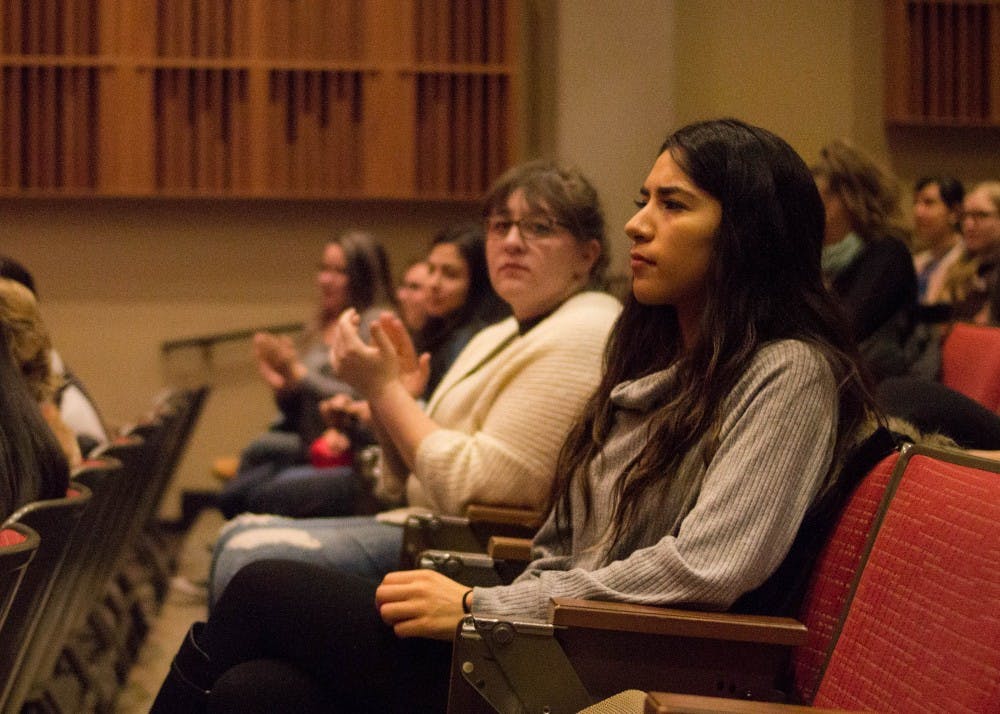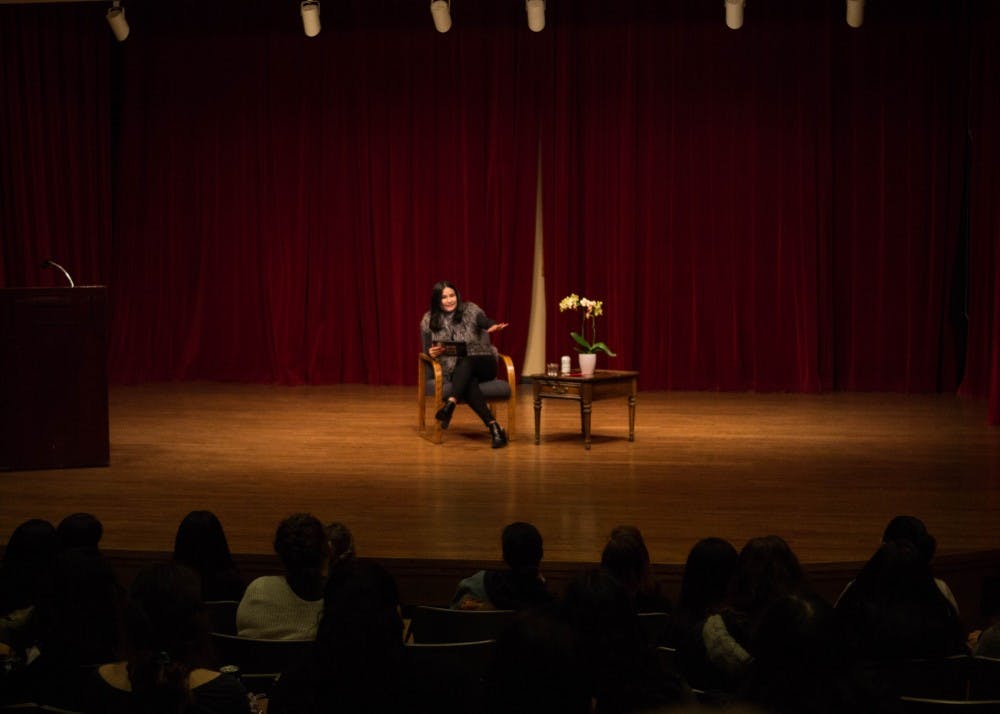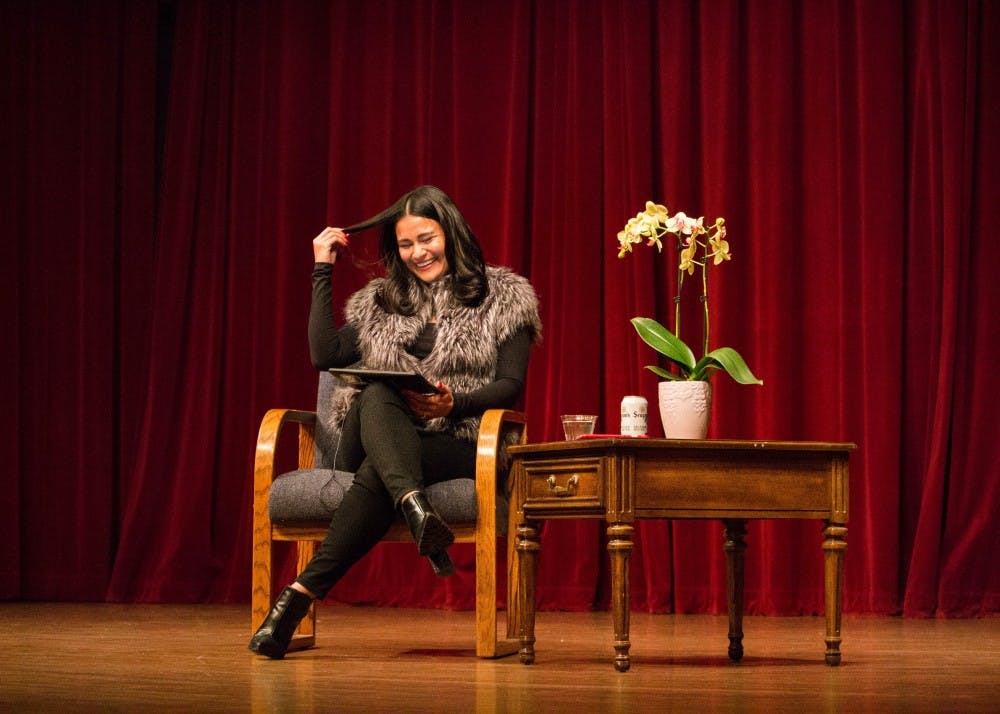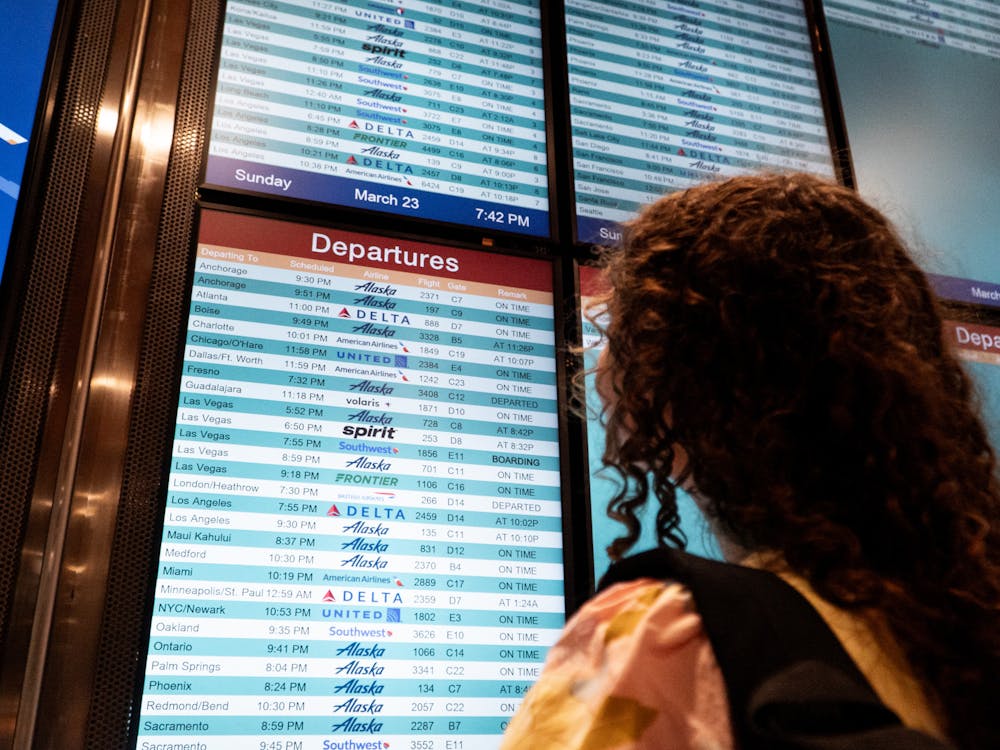When Prisca Dorcas spoke at the University of Portland on Friday night, she did not stand behind a podium to preach. Instead, she sat in an armchair in the middle of an empty stage, next to a small coffee table with a vase of flowers, and opened up a dialogue on systemic racism, oppression and colonialism.
Back in graduate school, Dorcas, the founder of Latina Rebels experienced a sense of culture shock after moving from Miami, Flo. to Nashville, Tenn.. After moving to a predominantly white city, she was inspired to decentralize white spaces of power. And during her talk, Dorcas explained why she doesn’t stand up. She said throughout history, white men have said and done “terrible things” to women and people of color from behind a podium, and she wants no part in that. So she chooses to sit to present a more conversational dialogue with the audience.
Mago Hunt Recital Hall was filled with nearly 100 students, faculty, staff and community members who displayed a great range of emotion from howling laughter, to quiet crying. She told the audience personal stories including her experiences at a predominantly white institution (Vanderbilt University where she earned her masters degree), having panic attacks in social situations due to racism, her relationships with white men and the pressure to get married she felt growing up.

Early in her talk, Dorcas explained her philosophy on dealing with systems of power and oppressors:
“Some people say you have to build bridges with your oppressors, but I’m not one of those people,” Dorcas said. “I burn those bridges down, mix las cenizas (the ashes) with essential oils and make a face mask.”
The room erupted in laughter for the first of many times throughout the evening. Dorcas’ deliberately conversational tone broke down the traditional speaker-audience barrier, and allowed for people in the crowd to be visibly at ease.
“I started to experience things that I had never experienced before, and it altered me drastically,” Dorcas said. “I began writing to heal from all these experiences of being in a (predominantly white institution).”
Dorcas said that growing up, she never really did well in school. In high school, she said she had to cry to her counselor to even let her graduate. But she thrived during her undergraduate years at Florida International University, a Hispanic-serving institution. Her outstanding performance earned her a full ride to Vanderbilt Divinity School, something she could not afford to risk by getting even one bad grade. She was shaken when she received her first low grade — a D on a paper that was drenched in red ink, along with a note from her professor that said, “You need to visit the writing center.”
She told the audience she was ashamed. As an English major, she had never struggled with writing, and she would even write athletes’ papers for money as an undergraduate. She realized she literally could not afford to fail, swallowed her pride and scheduled an appointment at the writing center.
Although she had lived in the United States for over 20 years, the receptionist at the writing center said her writing reflected that of someone who had learned English as a second language, and she directed her to the writing center for international students. When the receptionist at the international student writing center also turned her away because her paper demonstrated that she knew “too much English,” she was furious.
Dorcas had a panic attack, and ran across the quad to talk to her program’s admissions director. She wanted answers. Dorcas said that she stormed into the office, sweating and crying, and confronted her director.
“Why would you ever admit me into a program that you had not made any room for me for?” Dorcas asked her director. “Because I can’t be the first person that’s had this problem.”
After graduating and earning her master’s degree, Dorcas decided to take a break, go home, take care of herself and heal from the oppression she experienced. She focused on writing and expanding Latina Rebels.
Dorcas also spoke of the ethical dilemma she faced when she received an invitation to the White House by the Obama administration in the fall of 2016. Dorcas declined the invitation because although she felt validated in a way, she said she felt that she was being used by a powerful, colonized institution to validate people of color. Denying the offer also hurt her.
“I didn’t feel like (going to the White House) was aligned with my ethics,” Dorcas said. “But I remembered that I could essentially be cosigning to this awful empire that is the United States by participating in this context.”
Along with telling personal stories, she recited some of the short pieces she had written. She ended her talk with one of her most famous pieces, “Dear Woke Brown Girl.” In the end, the talk opened to a question-and-answer forum. Someone from the audience yelled out, “You’re so amazing!” and whispers of “she was so good” and “that was so inspiring” echoed throughout the Mago Hunt Recital Hall.

“I needed to hear stories that will validate me to know that my struggle is not just my struggle, because when you go to (predominantly white institutions), you really feel like you’re in the space alone,” said community member LaMar Thompson-Hightower. “So I really enjoyed (the talk), and hearing her (experiences) made me say ‘how do we unlearn this?’”
In the beginning, Dorcas emphasized that her experiences does not necessarily reflect those of all members of the Latinx community. But many audience members said they did relate to Dorcas’ stories.
“(The talk) was so relatable and so honest,” said Diana Salgado Huicochea, recipient of the 2018 Diversity Scholarship. “Some of the things that she said really made me think about how naive I was, like ‘Woah, this happened to me too,’ but I never realized it because I’m so used to it because it’s been normalized.”









